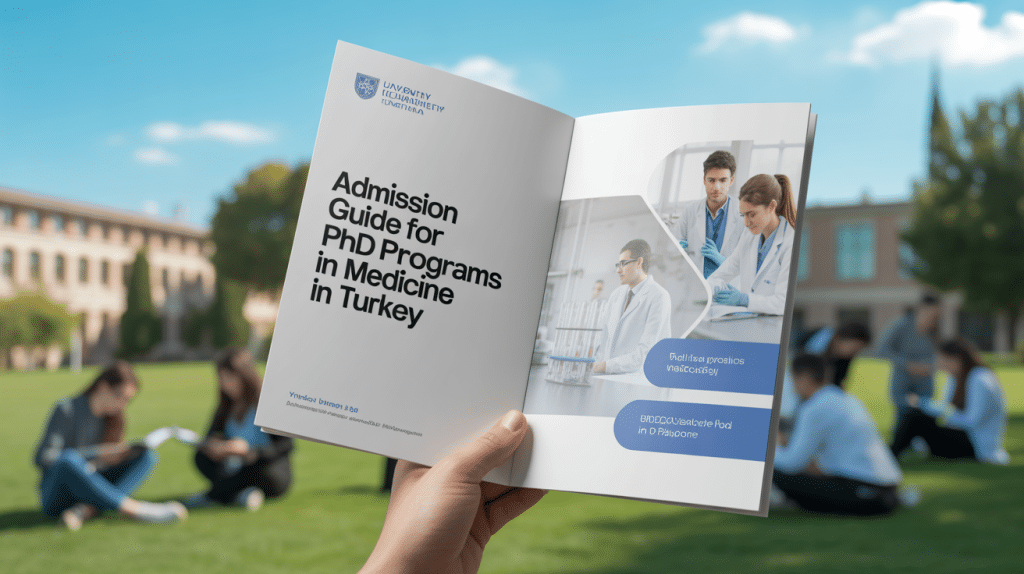Admission Guide for PhD Programs in Medicine in Turkiye
Basic Eligibility Requirements
For prospective candidates wishing to enroll in a PhD program in Medicine in Turkiye, the following eligibility criteria typically apply:
- Degree Requirements: Applicants must hold at least a Bachelor’s degree or a Master’s degree by thesis from a recognized institution.
- Language Proficiency:
- Turkish Programs: Demonstrating proficiency in the Turkish language is required for programs taught in Turkish.
- English Programs: For English-taught programs, candidates must meet specific English language requirements.
- Qualification Recognition: Foreign nationals and Turkish citizens who earned their degrees abroad must have their qualifications recognized by the Council of Higher Education in Turkiye.
Academic Requirements
Turkish universities hold their PhD programs to high academic standards, which generally include:
- Entrance Exam Scores: A minimum ALES (Academic Personnel and Postgraduate Education Entrance Exam) score of 60 is often required from the relevant score category. Alternatively, students may need at least 50 points from the TUS (Examination for Entrance to Specialty in Medicine).
- International Exam Scores: Equivalent scores from accepted international exams like GRE or GMAT may also be considered as determined by the specific university’s senate.
- Academic Background: Candidates are typically expected to have a strong foundation in Basic Sciences (biology, chemistry, molecular biology) or Health Sciences.
- Eligibility for Medical Doctors: Holders of an MD degree may also apply for PhD programs in medical specialties.
Top Turkish universities such as Medipol University and Uskudar University are known for their rigorous academic standards in the medical field.
Language Proficiency Requirements
Language proficiency is a significant factor for admission and varies depending on the program’s language of instruction:
- For Turkish-taught programs: Candidates need to achieve a minimum score of 60 on central foreign language exams, often English.
- For English-taught programs: A similar score of 60 or equivalent on recognized international exams is necessary.
- Common Requirements: TOEFL scores are frequently required for international applicants, and language certificates usually remain valid for three years from the exam date.
Application Documents
A well-prepared application package is crucial and typically includes:
- Academic Transcripts: High school diploma and transcripts (for undergraduate candidates) as well as Bachelor’s or Master’s degree certificates and transcripts.
- References: Usually three letters of recommendation from academic references.
- Motivation Letter: A compelling motivation letter explaining the candidate’s background and reasons for applying.
- Valid Passport: A copy of the applicant’s passport.
- Language Proficiency Certificates: Proof of proficiency in the required language(s).
- Standardized Test Scores: Evidence of scores from tests like ALES or GRE, where applicable.
Universities such as Aydin University and Galata University offer programs that often require these documents for admission.
Selection Process
The selection process for PhD programs in Medicine generally involves several key steps:
- Document Verification: All submitted documents undergo rigorous verification.
- Evaluation of Academic Performance: Academic records, especially ALES or basic medicine scores, carry significant weight, often accounting for up to 50% of the selection criteria.
- Grades Review: Evaluation of undergraduate and graduate-grade point averages.
- Recommendation and Motivation Letter Assessment: Analyzing letters of recommendation and the motivation letter for alignment with program goals.
- Interviews: Shortlisted candidates may undergo interviews as part of the selection process.
Program-Specific Requirements
Admissions criteria can differ significantly depending on the university and specific program. For instance:
- Medipol University may require unique documentation such as additional research experience or specific grades for entrance to their PhD programs.
- Istinye University and Beykent University might emphasize different aspects of research experiences, publications, or additional subject-specific requirements.
PhD programs in Medicine across Turkiye’s prestigious institutions provide international students with opportunities to pursue impactful research while experiencing the diverse Turkish culture.
Conclusion
In summary, gaining admission to a PhD in Medicine in Turkiye is a structured process that requires careful preparation and understanding of both general and program-specific requirements. Early application is highly advised as the admission process can be competitive, especially in esteemed institutions.
If you are an international student or an educational institution interested in expanding your reach or partnerships, Study in Turkiye is your trusted partner in facilitating educational opportunities. Whether you are seeking to become an agent for Study in Turkiye or have inquiries regarding admission processes, feel free to contact us or search for your dream university.
Explore the possibilities that wait in Turkiye’s robust education landscape, and take the first step towards your future today.
Take the Next Step with Study in Turkiye
Discover your educational opportunities with us and embark on your journey to pursue a PhD in Medicine in Turkiye.

